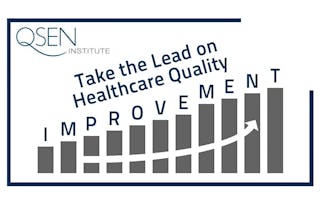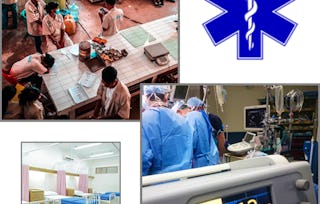This course introduces you to the concepts, theories and application of Quality Improvement (QI) in healthcare from a global perspective. You will hear from patients, clinicians and academics what quality improvement means to them, and how they work together to deliver change. Studying the challenges, they faced and strategies they utilised to overcome those challenges, you will learn to apply and critique core QI methods, from experts in the field.

Introduction to Quality Improvement in Healthcare
Ends soon: Gain next-level skills with Coursera Plus for $199 (regularly $399). Save now.

Introduction to Quality Improvement in Healthcare
This course is part of Quality Improvement in Healthcare Specialization

Instructor: Dr Thomas Woodcock
6,306 already enrolled
Included with
(87 reviews)
Skills you'll gain
Details to know

Add to your LinkedIn profile
See how employees at top companies are mastering in-demand skills

Build your subject-matter expertise
- Learn new concepts from industry experts
- Gain a foundational understanding of a subject or tool
- Develop job-relevant skills with hands-on projects
- Earn a shareable career certificate

There are 4 modules in this course
In this module you will learn what is meant by quality in healthcare and why quality improvement is needed, and gain a high level appreciation for some important approaches to quality improvement. You will hear from a patient perspective about the implications of poor quality healthcare, and see some evidence of the global scale of the problem. You will learn about a well-studied example of a quality improvement initiative, the Michigan Keystone project. In addition, you will participate in activities to enable you to reflect on your own knowledge and experience of quality, and quality improvement, in health and care systems.
What's included
4 videos14 readings3 assignments2 discussion prompts2 plugins
In this second module of the course you will be introduced to stakeholder engagement and empowerment including the importance of community, patient and public involvement. You will engage with lived experiences of service users and communities working together with clinicians and academics to improve health and healthcare. You will learn about the importance of good leadership and building a shared vision, and how to practically develop a programme theory for improvement through the Action Effect method.
What's included
5 videos6 readings3 assignments1 peer review2 plugins
This third module provides an introduction to process mapping and the Plan-Do-Study-Act Cycle as tools to support QI in practice. These methods are core in many approaches to improvement, used to understand and then improve processes of care. You will hear from experts in the field about their use of these methods, and their experiences leading quality improvement in practice, including during the COVID-19 pandemic. You will learn about challenges they encountered and strategies they used to overcome them.
What's included
4 videos4 readings2 assignments1 peer review1 discussion prompt
In this fourth module you will consider issues relating to the long term success of improvement initiatives – what influences whether improvement is sustained once achieved? You will apply an evidence-based tool promoting long term success to example QI initiatives. The context in which an improvement initiative takes place has a significant impact on both implementation and outcomes. Considering two contrasting case studies, one set in rural Guatemala and one in the USA, you will learn how to identify different elements of context and their interaction. In the later part of the module you will learn about common challenges and obstacles that QI teams face when designing and implementing their QI projects, including the role of fidelity in the application of quality improvement methods.
What's included
4 videos5 readings2 assignments2 discussion prompts2 plugins
Earn a career certificate
Add this credential to your LinkedIn profile, resume, or CV. Share it on social media and in your performance review.
Instructor

Offered by
Explore more from Public Health
 Status: Preview
Status: PreviewCase Western Reserve University
 Status: Free Trial
Status: Free TrialImperial College London
 Status: Free Trial
Status: Free TrialUniversity of Michigan
 Status: Free Trial
Status: Free TrialRutgers the State University of New Jersey
Why people choose Coursera for their career




Learner reviews
87 reviews
- 5 stars
94.25%
- 4 stars
3.44%
- 3 stars
0%
- 2 stars
0%
- 1 star
2.29%
Showing 3 of 87
Reviewed on Jan 26, 2024
The best learning experience I had so far. I'd recommend anyone who wants to study Quality Improvement to register to Coursera.
Reviewed on Sep 10, 2022
Extremely organized and content oriented But one thing to mention that peer checked assignment if present then it should be made sure that it is checked as soon as possible without delay
Reviewed on Jun 13, 2023
This course was very informative and the ability for it to be interactive with the content with hands-on applied projects helped the information stick!
Frequently asked questions
To access the course materials, assignments and to earn a Certificate, you will need to purchase the Certificate experience when you enroll in a course. You can try a Free Trial instead, or apply for Financial Aid. The course may offer 'Full Course, No Certificate' instead. This option lets you see all course materials, submit required assessments, and get a final grade. This also means that you will not be able to purchase a Certificate experience.
When you enroll in the course, you get access to all of the courses in the Specialization, and you earn a certificate when you complete the work. Your electronic Certificate will be added to your Accomplishments page - from there, you can print your Certificate or add it to your LinkedIn profile.
Yes. In select learning programs, you can apply for financial aid or a scholarship if you can’t afford the enrollment fee. If fin aid or scholarship is available for your learning program selection, you’ll find a link to apply on the description page.
More questions
Financial aid available,
¹ Some assignments in this course are AI-graded. For these assignments, your data will be used in accordance with Coursera's Privacy Notice.





